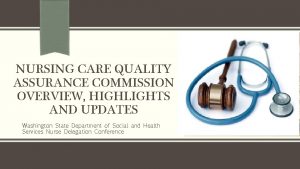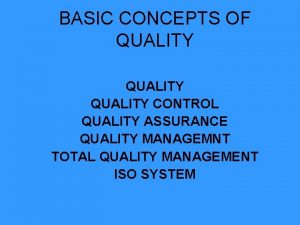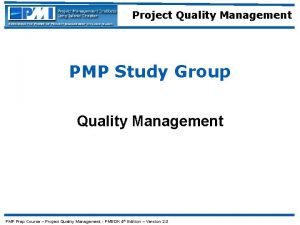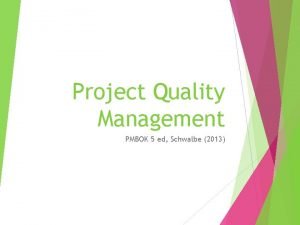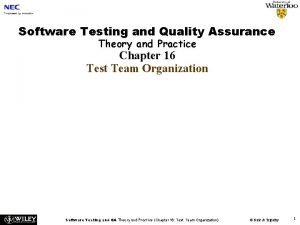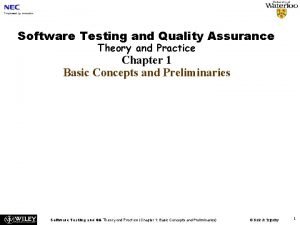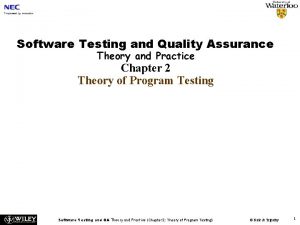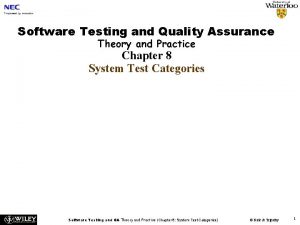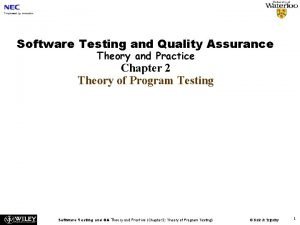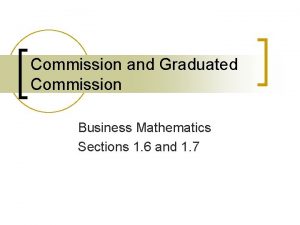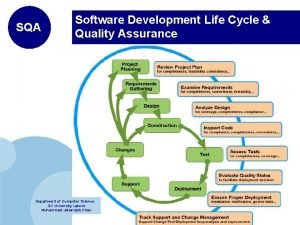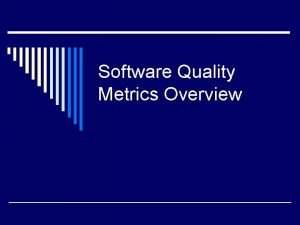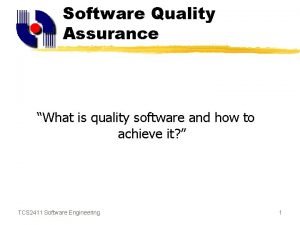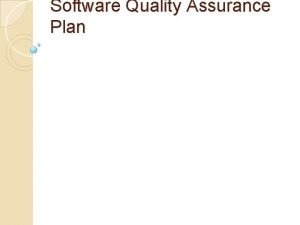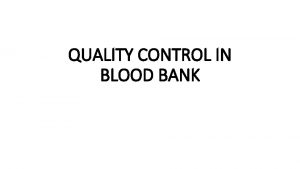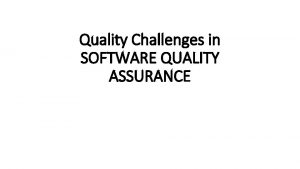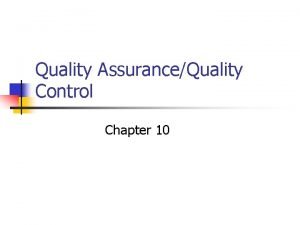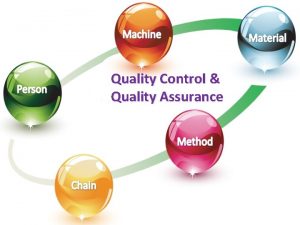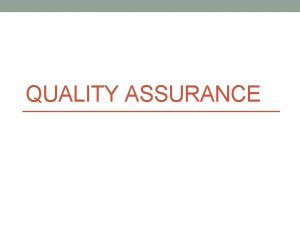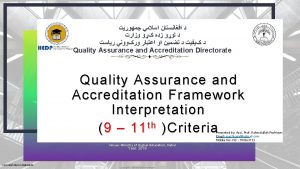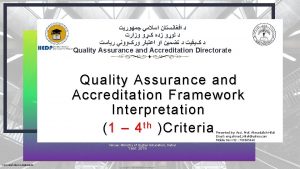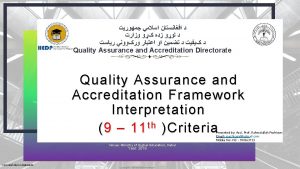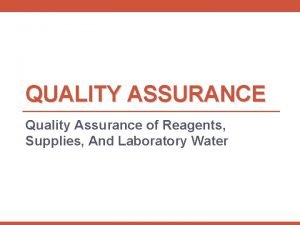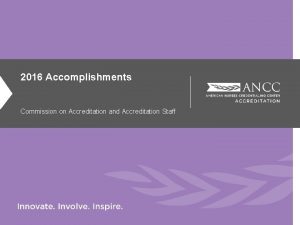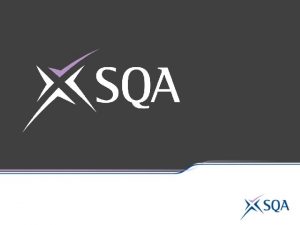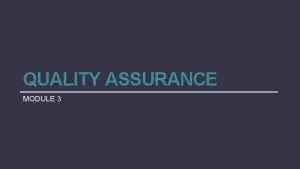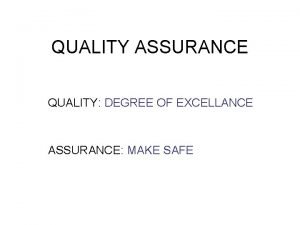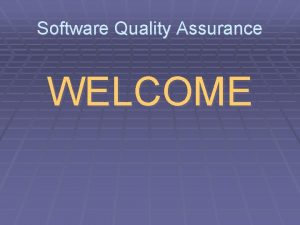Accreditation and Quality Assurance Commission AQAC Ministry of





























- Slides: 29

Accreditation and Quality Assurance Commission (AQAC) Ministry of Education & Higher Education Palestine Mohammed M Alsubu’ Professor & Head of AQAC November 13 -5 2009 Accreditation and Quality Assurance Commission 11/5/2020

General Aspects of the Palestinian Quality Assurance (QA) System Accreditation and Quality Assurance Commission 11/5/2020

The Palestinian quality assurance policy was upgraded in 2002 simultaneously with the establishment of 'Accreditation and Quality Assurance Commission' (AQAC) as the only official accreditation body in Palestine for higher education (HE). Accreditation and Quality Assurance Commission 11/5/2020

AQAC is: A governmental semiautonomous body under the umbrella of the Ministry of Education and Higher Education (Mo. EHE) and directly responsible to the Minister. Accreditation and Quality Assurance Commission 11/5/2020

Accreditation and Quality Assurance Commission 11/5/2020

Vision: To have Palestine as manpower resourceful through the provision of quality education in Palestinian HEIs that is value based and comparable to international scope of excellence. Mission: Reinforce a culture of quality education system based on accountability, control, guidance, and improvement. Accreditation and Quality Assurance Commission 11/5/2020

In Palestine, like other countries, the following trends in higher education were the impetus behind establishing a system for QA in HE: • • • Growing social demand Privatization of higher education governments’ demand for value for money Globalization Evidence quality at home and aboard Accreditation and Quality Assurance Commission 11/5/2020

Statistics Enrolled students HEIs year 2004 2005 2006 2007 2008 QOU 40230 46453 52914 57177 60631 Traditional U 68435 76650 79877 93922 102125 U- colleges 4710 6034 6347 7033 5228 Community C 8511 9002 11136 11241 12921 total 123, 890 140, 144 152, 280 171, 380 182, 913 Graduates QOU 2536 3040 3751 4397 5025 Traditional U 7722 9927 10074 12700 15435 U- colleges 564 1879 1512 1660 1319 Community C 1503 1727 1964 2824 3496 total 12, 325 16, 573 17, 301 21, 581 25, 275 Employee QOU 2135 2111 2481 2666 2325 Traditional U 5446 5884 6501 6852 7193 U- colleges 830 1028 1089 1102 980 Community C 723 806 1116 1144 1214 11, 187 11, 764 11, 712 total 9, 134 9, 829 Accreditation and Quality Assurance Commission 11/5/2020

Accreditation and Quality Assurance Commission 11/5/2020

Accreditation and Quality Assurance Commission 11/5/2020

Accreditation and Quality Assurance Commission 11/5/2020

There are 48 HEIs in Palestine: 14 universities; 9 public + 3 private +2 state (14 conventional + 1 open learning) 14 university colleges: 5 state + 2 UNRWA + 7 private 19 community college: All are private Accreditation and Quality Assurance Commission 11/5/2020

The previous trends have led to a growing concern with the issue of ‘quality’ of HE and subsequently ‘how to assure it’. AQAC and other professional bodies have been working to achieve this objective by direct monitoring of the quality of institutions and programs in Palestinian HEIs using an effective QA system Accreditation and Quality Assurance Commission 11/5/2020

The Palestinian QA system relates to – institutions (state, public & private) and – programs (both undergraduate and graduate). Accreditation and Quality Assurance Commission 11/5/2020

The role of Palestinian HEIs, as seen by Mo. EHE is to: – Produce qualified manpower – Train for a research career – Manage teaching provision Accreditation and Quality Assurance Commission 11/5/2020

The QA system in Palestine has three main broad purposes: • quality control • accountability/ guidance • improvement purposes. Accreditation and Quality Assurance Commission 11/5/2020

Palestinian QA system address’s different functions that include: • assessments related to the initial introduction of programs and institutions (initial accreditation and licensing respectively) and leading to the status of a publicly - recognized entity) • supervision of the current functioning institutions and programs (commonly relating to minimum standards) • accreditation • professional certification of graduates in chosen professional fields. • provision of information on the recognition and accreditation status of both institutions and programs. Accreditation and Quality Assurance Commission 11/5/2020

The QA system in Palestine is both internal (by HEI) ad external (by AQAC), and is: 1. Compulsory/ voluntary? ! 2. Uses both 'fitness for purpose' and 'standard-based' approaches as appropriate? ! 3. Uses both accreditation and quality audit options? ! 4. Deals with both public and private institutions, university and non-university sector institutions and all types of academic programs Accreditation and Quality Assurance Commission 11/5/2020

1. Compulsory/ voluntary? ! 1. 1 Compulsory: No new programs and/or institutions can operate without prior accreditation from AQAC 1. 2 Voluntary: Accreditation of long established institutions is still optional (but not academic programs) Accreditation and Quality Assurance Commission 11/5/2020

2. Uses both 'fitness for purpose' and 'standard - based' approaches as appropriate? !: 2. 1 The 'fitness-for-purpose' approach (mainly for technical colleges); begins by analyzing the stated purpose of a HEI or program (mission statement) whether it is in compliance with Mo. EHE vision or not. 2. 2 The ‘standard – based’ approach: addresses input factors relating to students, staff, buildings, facilities and finances. It also includes process elements such as governance and management systems, as well as the basic research activities perceived to be necessary for higher education to be meaningful. Accreditation and Quality Assurance Commission 11/5/2020

3. Uses both accreditation and quality audit options? ! 3. 1 Accreditation comprises three elements and generally involves three steps with specific activities as follows: i) Self-assessment; a self-evaluation process conducted by the faculty, the administrators, and the staff of the institution or academic program, resulting in a report that takes as its reference the set of standards of AQAC. Accreditation and Quality Assurance Commission 11/5/2020

3. 1 Accreditation… ii) peer review ; a study visit conducted by a team of peers selected by AQAC, that reviews the evidence, visits the premises, and interviews the academic and administrative staff, resulting in an assessment report, including a recommendation to AQAC. iii) decision-making ; examination by AQAC board to the evidence and recommendation on the basis of the given set of criteria concerning quality and resulting in a final judgment and the communication of the formal decision to the institution and other constituencies. Accreditation and Quality Assurance Commission 11/5/2020

3. 2 Quality audit option focuses on: – the institution’s internal reporting mechanisms, – data collection mechanisms on ‘teaching performance’, – whether the institution collects systematic data on student, graduate and employer satisfaction. Accreditation and Quality Assurance Commission 11/5/2020

4. Deals with both public and private institutions, university and non-university sector institutions and all types of academic programs Accreditation and Quality Assurance Commission 11/5/2020

4. 1 For the Institution, the followings are considered: – Mission, Goals & Objectives; – Governance, Administration, Planning & Communication – Institutional Scope; (Educational programs, Research, Internationalization & community service) – Institutional Resources & Services (Human, , Educational, Physical, and Financial resources, Information, Institutional development & Student services. Accreditation and Quality Assurance Commission 11/5/2020

4. 2 For the program, the followings are considered • • • Mission and General Objectives Program structure and content Teaching- Learning Educational Environment Students Curriculum and Teaching plan Success Rates Graduates Program Faculty Teaching – Learning facilities External Contacts and Knowledge exchange Internal Quality Evaluation Accreditation and Quality Assurance Commission 11/5/2020

Palestinian QA system provides information on the quality of programs and institutions which may be used by a variety of stakeholders, including – government; - To define higher education country-wide and out side - To assure quality higher education – students - To assist in selecting an institution for study and career guidance - To assist in employment – institutions of higher education - To improve institutional information and data - To enhance institutional planning - labor market - to assess labor market relevance of newly established Bachelor and Master programs Accreditation and Quality Assurance Commission 11/5/2020

Implementation of the QA system suffers several limitations like: – Several HEIs and many programs had started without accreditation long before the establishment of Mo. EHE, – the system does not attract sufficient number of respected peer reviewers. – a program accreditation is a relatively expensive procedure and the expenses have to be covered by institutions. Accreditation and Quality Assurance Commission 11/5/2020

Thanks Accreditation and Quality Assurance Commission 11/5/2020
 Aqac
Aqac Washington medical quality assurance commission
Washington medical quality assurance commission Nursing quality assurance commission
Nursing quality assurance commission Nursing quality assurance commission
Nursing quality assurance commission Quality control and quality assurance
Quality control and quality assurance Quality control concepts
Quality control concepts Quality control vs quality assurance pmp
Quality control vs quality assurance pmp Pmbok quality management
Pmbok quality management Process of nursing audit
Process of nursing audit Quality improvement vs quality assurance
Quality improvement vs quality assurance Joint commission accreditation standards
Joint commission accreditation standards Software testing and quality assurance: theory and practice
Software testing and quality assurance: theory and practice Quality revolution in software testing
Quality revolution in software testing Theory of goodenough and gerhart
Theory of goodenough and gerhart Software testing and quality assurance theory and practice
Software testing and quality assurance theory and practice Software testing and quality assurance theory and practice
Software testing and quality assurance theory and practice Staqc south tees
Staqc south tees Sqa tools and techniques
Sqa tools and techniques European standards and guidelines for quality assurance
European standards and guidelines for quality assurance Project scheduling and tracking software quality assurance
Project scheduling and tracking software quality assurance What is graduated commission
What is graduated commission Sdlc quality assurance
Sdlc quality assurance Metrics for software quality
Metrics for software quality Iso 9001 software quality assurance
Iso 9001 software quality assurance Software quality assurance plan
Software quality assurance plan Quality control in blood bank pdf
Quality control in blood bank pdf Software quality challenges
Software quality challenges Qc purpose
Qc purpose Quotes on quality assurance
Quotes on quality assurance Contoh kegiatan quality control di rumah sakit
Contoh kegiatan quality control di rumah sakit


